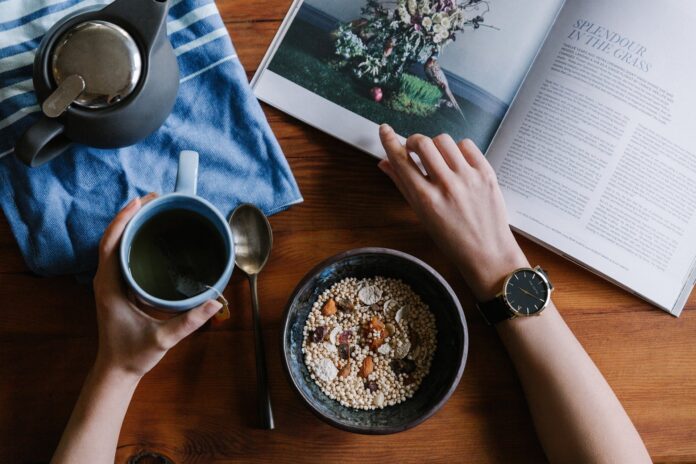Did you know that whether you have breakfast or not, and what you eat in the morning, can make all the difference in how you perform and how tired you feel throughout the day?
Especially dangerous is the “blood sugar spike” that occurs when you skip breakfast.
If you skip breakfast, you will get hungry and eat more than you need for lunch.
Our blood glucose level always goes up and down in small fluctuations, but if we eat a large amount of food after being hungry, our blood glucose level will spike extremely fast and then plummet.
This phenomenon is called a “blood sugar spike” and is said to lead to diabetes and heart disease.
In young people, these spikes are not immediately linked to lifestyle-related diseases, but the sudden spikes in blood sugar levels can cause drowsiness and fatigue, which can reduce performance throughout the day, let alone in the morning.
Breakfast is the only way to recharge your body for the day.
Another disadvantage of not having breakfast is that it makes it harder for your body temperature to rise.
There is a rhythm in which the human body temperature becomes lower before and during sleep, and higher before waking and upon awakening.
However, if you skip breakfast, the “rise in body temperature” that should normally occur during the day will be slower than when you eat breakfast, making it harder to achieve the desired performance.
In addition, breakfast is a source of energy for the day’s activities.
The previous day’s dinner, which was eaten last before breakfast, is digested before going to bed or during the night, and is used to repair and rebuild the body.
Therefore, the energy that is the source of the day’s activities must be put into your body in the morning, otherwise you will face your morning work with “no energy”.
If you don’t eat, you will be fatigued.
Therefore, skipping breakfast is like having to survive until noon with a smartphone whose battery is still low because it was not charged during the night.
Above all, not being able to get your full power out in the morning, when your brain is supposed to be at its sharpest, can be a big blow to a business person.
Fix the “time” for breakfast
It is not enough to eat breakfast any time in the morning, you should also fix the time of breakfast as much as possible.
As with sleep deprivation, fixing the time will help you establish a rhythm in your life and regulate your autonomic nervous system, which plays a major role in recovery.
Besides, breakfast is the easiest of the three meals to fix, since you don’t often have plans in the morning.
Furthermore, fixing the time for breakfast has the additional benefit of fixing the time for waking up, which creates a virtuous cycle and makes it easier to adjust your daily rhythm.
However, “I slept until the last minute, but I ate breakfast! This is also a behavior to avoid.
If you don’t have time to eat, you will eat too fast, which will also cause a “blood sugar spike” that will lead to fatigue.
In order to avoid fatigue in the morning, you should set a regular time for breakfast.
Brown carbohydrates contain eight times more nutrients than white rice.
y the way, you also want to be careful about what you eat for breakfast.
Breakfast, in particular, tends to be a simple affair with only carbohydrates.
However, not all carbohydrates, such as bread, are bad.
Bread made of refined flour and white rice are high in carbohydrates, so avoid them and replace them with rye bread or brown rice.
The bottom line is that you should avoid white carbohydrates and eat brown carbohydrates as much as possible.
One thing I recommend is couscous, which is considered the world’s smallest pasta.
In addition to rich fiber, couscous contains “calcium” and “magnesium”.
Magnesium, a type of mineral, is a strong ally for conditioning, as it helps strengthen bones and teeth, reduces stress, and increases metabolism.
It is also effective if you take in “minor grains” as well.
Minor grains such as quinoa, amaranth, millet, and millet are very good “super conditioning foods” for the body.
I recommend mixing them in with salads and taking them naturally without worrying too much.
Minor grains are rich in “dietary fiber” and “vitamins,” which help suppress the rise in blood sugar levels and support the elimination of visceral fatigue.
The dietary fiber contained in quinoa is about 8 times that of “white rice”.
Quinoa also contains 2 to 8 times as much protein, potassium, calcium, magnesium, iron, and other essential nutrients as white rice. It is truly a superfood.
Millet is rich in vitamin B1, which helps relieve fatigue in the muscles, and also contains potassium and magnesium, which are essential for relieving fatigue.
Amaranth contains lysine, an essential amino acid that helps build strong bones and muscles, and activates energy metabolism.
Minor grains have become well known as a candidate for NASA’s space food and eaten by supermodels, but you should not assume that they are a “special health food” or something for people who are concerned about unchasing and beauty.
Whether you feel tired easily or want to make your body less tired, you can benefit from “less fatigue” if you take it in.
Please try to be creative with your breakfast time and what you eat so that you can be more active in business and other activities.




